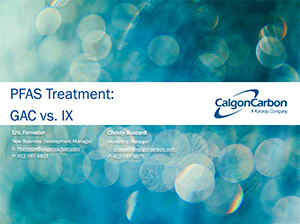Our website uses cookies, including third parties’ profiling cookies, to improve your user experience. You can learn more about how we use cookies and how to change your cookies settings in our Privacy Policy. By closing this message, clicking above or continuing to use this site, you consent to our use of cookies.
Municipal Water Treatment Professionals
Calgon Carbon partners with water treatment facilities seeking solutions for PFAS removal and destruction (>99.99% total PFAS). Learn more about why we’re the partner you need to develop the right PFAS treatment strategy.
Industrial Environmental Professionals
Calgon Carbon has developed many effective solutions and strategies for PFAS remediation issues for companies of all sizes. Learn more about how we can develop a customized option for your operation.
Products & Systems Tailored for Your Need
Our products and engineered systems are found in water treatment facilities and industrial applications across the U.S. and beyond. These products and services, combined with expert and on-site support, allow our customers to be confident knowing their water is being treated effectively for PFAS.
Calgon Carbon has offered the proven treatment solution for PFAS removal in both drinking water and remediation applications for over 15 years with our FILTRASORB granular activated carbon (GAC) and Equipment product lines. Calgon Carbon provides a complete solution including activated carbon, equipment, on-site installation and exchange services, reactivation, and financing.
CCC offers a full range of GAC adsorption equipment—a simple and effective solution that requires little operator involvement. Testing is important for system design and cost performance information.
Communities already using GAC to remove T&O or other contaminants from drinking water sources have been protected from PFAS.
We have a focused PFAS Team in place and are ready to respond immediately with technical services, equipment and carbon supply.
What are perfluorinated compounds (PFAS)?
- Manmade fluorinated compounds which are not naturally found in the environment.
- Are used in a variety of products such as fire fighting foams, coating additives as a surface-active agent.
- PFOS (perfluorooctane sulfonate) and PFOA (Perfluorooctanoic acid) are the most commonly discussed PFAS, but PFAS is a class with over 4,000 compounds.
- Large amounts of PFAS have been produced during past manufacturing processes and released to the air, soil and water.
Why are PFAS harmful?
- PFAS are persistent and mobile in the atmosphere and aqueous environments, due to their chemical stability and low volatility.
- Animal toxicology studies indicate potential developmental, reproductive and systematic effects.
- After oral exposure, PFAS accumulate and adsorb in the serum, kidney, and liver.
- Resistant to direct oxidation, photolytic degradation, biodegradation and air stripping/ vapor extraction, making their removal difficult.
What is the EPA’s stance?
- The EPA’s Contaminant Candidate List 5 (CCL 5) includes Per-and polyfluoroalkyl substances (PFAS) as a chemical group.
- The EPA has taken steps to further investigate other PFAS and related chemicals as well as to reduce their emissions and use in products.
What is the solution?
- Granular activated carbon (GAC) filters have been recognized as effective technologies for reducing PFAS compounds from water.
- Spent activated carbon can be thermally reactivated, destroying more than 99.99% of the adsorbed PFAS contaminants and allowing the activated carbon to be recycled and reused.
- Recent testing of Calgon Carbon type FILTRASORB 400 virgin GAC shows successful removal of many PFAS including:
-
- Perfluorobutanoic Acid (PFBA)
- Perfluoropentanoic Acid (PFPA)
- Perfluorohexanoic Acid (PFHxA)
- Perfluoroheptanoic Acid (PFHtA)
- Perfluorooctanoic Acid (PFOA)
- Perfluorodeconaoic Acid (PFDA)
- GenX
- The strong fluorine-carbon bond and low vapor pressure makes PFAS resistant to a number of conventional water treatment technologies, including direct oxidation, biodegradation, air stripping, vapor extraction and direct photolysis (UV).
- Since each water source contains different combinations and levels of PFAS, as well as TOC, it is advised that a lab or pilot test (such as an Accelerated Column Test or ACT) be performed on a representative water sample to determine the adsorption zone needed, as well as the estimated carbon exhaustion rate to properly design an activated carbon adsorption system.
What can Calgon Carbon do for you?
- Provide proven and cost effective solutions with activated carbon adsorption technology that cover a broad range of applications and system sizes.
- Temporary and permanent GAC systems that can be rapidly deployed.
- Our technical and engineering team can perform laboratory and field tests as needed, and tailor solutions for various application and customer needs.
- CCC has carbon reactivation sites globally that will thermally destroy greater than 99.99% of PFAS and enable the reuse of the activated carbon.
PFAS Reactivation Memo June 2020
Summary Report: Removal of Short Chain PFAS Compounds via GAC
Webinar: Granular Activated Carbon – A Proven Solution for PFAS Removal
FILTRASORB Granular Activated Carbon
Field Tests and Pilot Systems to Test Water
PFAS
CCC FILTRASORB can remove typical levels of PFOA and PFOS to non-detect levels. Our studies show that reagglomerated, coal-based GAC performs significantly better than coconut for PFOA and PFOS removal. Even if local regulations require lower PFAS concentrations than the EPA health advisory, GAC is an effective solution.
Learn More >>Short-Chain PFAS
Coal based GAC effectively removes short chains. Our reagglomerated bituminous coal-based product will remove an array of PFAS including both long- and short-chain compounds.
Learn More >>
